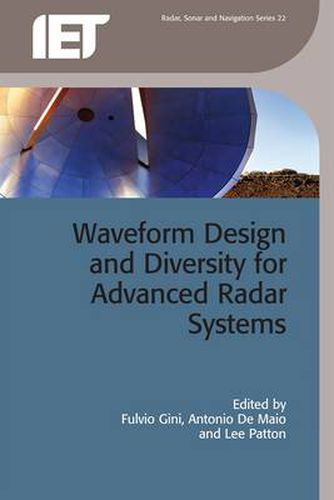Readings Newsletter
Become a Readings Member to make your shopping experience even easier.
Sign in or sign up for free!
You’re not far away from qualifying for FREE standard shipping within Australia
You’ve qualified for FREE standard shipping within Australia
The cart is loading…






The phrase ‘waveform design and diversity’ refers to an area of radar research that focuses on novel transmission strategies as a way to improve performance in a variety of civil, defense and homeland security applications. Three basic principles are at the core of waveform diversity. First is the principle that any and all knowledge of the operational environment should be exploited in system design and operation. Second is the principle of the fully adaptive system, that is, that the system should respond to dynamic environmental conditions. Third is the principle of measurement diversity as a way to increase system robustness and expand the design trade space. Waveform design and diversity concepts can be found dating back to the mid-twentieth century. However, it has only been in the past decade or so, as academics and practitioners have rushed to exploit recent advances in radar hardware component technology, such as arbitrary waveform generation and linear power amplification, that waveform diversity has become a distinct area of research. The purpose of this book is to survey this burgeoning field in a way that brings together the diverse yet complementary topics that comprise it. The topics covered range from the purely theoretical to the applied, and the treatment of these topics ranges from tutorial explanation to forward-looking research discussions. The topics treated in this book include: classical waveform design and its extensions through information theory, multiple-input multiple-output systems, and the bio-inspired sensing perspective; the exploration of measurement diversity through distributed radar systems, in both cooperative and non-cooperative configurations; the optimal adaptation of the transmit waveform for target detection, tracking, and identification; and more. This representative cross-section of topics provides the reader with a chance to see the three principles of waveform diversity at work, and will hopefully point the way to further advances in this exciting area of research.
$9.00 standard shipping within Australia
FREE standard shipping within Australia for orders over $100.00
Express & International shipping calculated at checkout
The phrase ‘waveform design and diversity’ refers to an area of radar research that focuses on novel transmission strategies as a way to improve performance in a variety of civil, defense and homeland security applications. Three basic principles are at the core of waveform diversity. First is the principle that any and all knowledge of the operational environment should be exploited in system design and operation. Second is the principle of the fully adaptive system, that is, that the system should respond to dynamic environmental conditions. Third is the principle of measurement diversity as a way to increase system robustness and expand the design trade space. Waveform design and diversity concepts can be found dating back to the mid-twentieth century. However, it has only been in the past decade or so, as academics and practitioners have rushed to exploit recent advances in radar hardware component technology, such as arbitrary waveform generation and linear power amplification, that waveform diversity has become a distinct area of research. The purpose of this book is to survey this burgeoning field in a way that brings together the diverse yet complementary topics that comprise it. The topics covered range from the purely theoretical to the applied, and the treatment of these topics ranges from tutorial explanation to forward-looking research discussions. The topics treated in this book include: classical waveform design and its extensions through information theory, multiple-input multiple-output systems, and the bio-inspired sensing perspective; the exploration of measurement diversity through distributed radar systems, in both cooperative and non-cooperative configurations; the optimal adaptation of the transmit waveform for target detection, tracking, and identification; and more. This representative cross-section of topics provides the reader with a chance to see the three principles of waveform diversity at work, and will hopefully point the way to further advances in this exciting area of research.